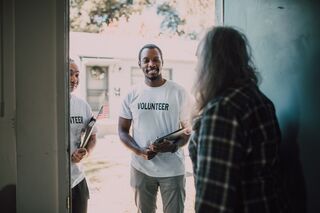Health
Power Differentials Are Our Obstacle to Community Well-Being
Out-of-the-box thinking.
Posted July 13, 2021 Reviewed by Jessica Schrader
Key points
- Differential power dynamics could represent our most pernicious obstacle to enhancing community well-being.
- We all share responsibility for ensuring liberatory rights to everyone.
- We have the capacity to establish a global culture of healing and well-being.
We are familiar with calls to defund the police, as well as other discussions regarding civilian and community board oversight of the police. This is a healthy dialogue, but one that continues to emphasize a separation of those who are society’s so-called protectors versus those who are in need of what has been identified as protection. But the idea of safety and protection through enforcement centers on a type of thinking that insists there is an enemy among us and that we need to protect the property, wealth, and resources of certain people over other people (Alexander, 2020; Wilkerson, 2020). These differential power dynamics could represent our most pernicious obstacle to enhancing community well-being, which can only be accomplished by working together to heal from the loss and trauma we have all suffered in varying degrees depending on the level of privilege (Wilkerson, 2020).
Just maybe there is a radically different future that could emerge, one that draws upon lessons learned in a world that features radically different power differentiations between how we negotiate conflict and uphold community wellness values. Although the past was not less violent (Dunbar-Ortiz, 2014; Kendi, 2016), there was a time when small villages were responsible for ensuring the well-being of all members (Jason, 2013). With less differentiation, when a tree blocked a pathway, the community intuitively perceived it as their duty to help clear the path for the good of all. Is there something within these practices that might have relevance for our current crisis with the police, as well as other problems, such as socioeconomic inequalities?
Transformations have often come in a time of crisis, in the way we approach current intransigent problems. The horrific violence perpetrated against Rodney King, and again against Trayvon Martin, to name just two of the hundreds of individuals victimized by police or racist vigilante violence over just the past 12 decades, became turning points for the perceived post-racial world to finally admit social injustices, and begin to reconsider non-violent solutions to our ongoing societal injustices. Is it not possible that George Floyd’s murder by police brutality, rooted in anti-Blackness (a white pathology of dehumanization), might be one of those watershed moments, where we have a rare opportunity to really transform the world?

Given links between extremist groups and police, and the increasing militarization of the police, there are legitimate reasons for distrusting those enforcing the law. One does wonder why shooting a Black person for a minor offense, or even no offense at all, is such an automatic response toward Black people, when so many white people committing minor or worse offenses never suffer any consequences (DiAngelo, 2018; Dunbar-Ortiz, 2014), and in the case of the U.S. Capitol insurrection are rewarded for their crimes. Why the deadly reaction just for being Black? Why is there such violent, anti-Blackness (DiAngelo, 2018), and white terrorist reaction to questioning systems that bring so much harm to others?
By authorizing a certain privileged group with the freedom to uphold the law as they see fit while violating those same laws, and with police peers reinforcing and solidifying anti-Black belief in the right to control and dominate with violence and terrorism, these power differentials have ultimately led to egregious abuse. This U.S. policing system has a sordid origin story of slave patrols to catch, torture, and brutalize enslaved and exploited peoples in the U.S. (Alexander, 2020; Dunbar, 2018; Kendi, 2016); tasked with brutality to uphold the interests land-owning planter elites (Dunbar, 2018; Kendi, 2016), with no concern for protecting communities (Cashin, 2018; Dunbar-Ortiz, 2014), so even the term “police” is historically re-traumatizing for the targeted communities (Menakem, 2017). Additionally, when social and racial justice organizations and scholars, evidence information and artifacts of these inequities, those with embedded anti-Black ideologies and power differential continue to leverage their anti-Blackness and white terrorism to marginalize books, research, and evidence that opposes their vitriol. As long as we have biased policing professionals upholding anti-Black ideology and white terrorism, the inevitable occurs, where inequities are disowned and solutions fall to others and other generations to address inequalities and injustices that too frequently occur in the U.S. Why is there such a violent need to uphold systems that cause harm and trauma?
Given the inequitable history of relations between marginalized communities and the police, solutions require out-of-the-box thinking. Examining institutions and programs that have effectively solved problems might be a beneficial starting point. Perhaps the creation of a Social Service/Mental Health Corps, a program where policing professionals and community members can be trained to resolve conflict through non-violent methods? Could such a system actively involve more members of our society in socially supporting those who are in crisis and contributing to solutions that involve self-development and empathy-building to labor for what communities need, instead of trying to solve a community's problems from their own bias? These supportive practices are present in white communities (Hagerman, 2020).
Efforts are increasing to integrate mental health professionals into first responder teams to address issues that arise responding to calls involving substance use disorders, homelessness, and intimate partner violence. Given this movement to transfer activities from policing to social service interventions, it might now be possible to educate and train the public to join a Social Service/Mental Health Corps that would assist those providing such frontline services to community members in distress. This would allow public volunteers to create long-term social support systems as they engage in peripheral community activities that provide second and third tier support to first responder teams.
A still larger transformation might involve youth between the ages of 18 and 20 asked to provide two years of service with the Social Service/Mental Health Corps. A similar service is required in some countries. The advantage is this system guarantees that all citizens see their participation in supporting their communities, helping to develop empathy and a sense of social responsibility, as a fundamental passport for breaking down the barriers between those in power versus those denied power. We all know that there are many settings that could be revitalized by a regular infusion of idealism and enthusiasm.
We have the capacity to travel to Mars, to cure certain cancers, to reduce global warming, and to end anti-Black ideology and white terrorism. Just as important, we have the capacity to re-establish a global culture of healing and well-being. Right now, we are determining a world citizenship that redefines previously perceived problems as educational and social justice opportunities to really transform the world. A true revolution is now guided by a simple vision where we all share responsibilities for ensuring and solidifying liberatory rights to everyone.
References
Alexander, M. (2020). The new Jim Crow: Mass incarceration in the age of colorblindness, 10th anniversary edition. Unabridged. New Press.
Cashin, S. (2018). Loving: Interracial intimacy in America and the threat to white supremacy. Beacon Press.
DiAngelo, R. (2018). White fragility: Why it’s so hard for white people to talk about racism. Beacon Press.
Dunbar, E. A. (2018). Never caught: The washingtons' relentless pursuit of their runaway slave, Ona Judge. 37 Ink.
Dunbar-Ortiz, R. (2014). An indigenous peoples' history of the United States. Beacon Press.
Hagerman, M. A. (2020). White kids: Growing up with privilege in a racially divided America. NYU Press.
Jason, L.A. (2013). Principles of social change. Oxford University Press.
Kendi, I. X. (2016). Stamped from the beginning: The definitive history of racist ideas in America. Bold Type Books.
Menakem, R. (2017). My grandmother’s hands: Racialized trauma and the pathway to mending our hearts and bodies. Central Recovery Press.
Wilkerson, I. (2020). Caste: The origins of our discontents. Random House.


